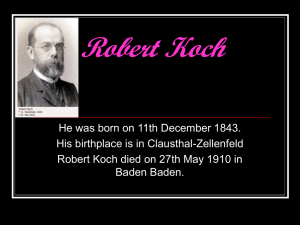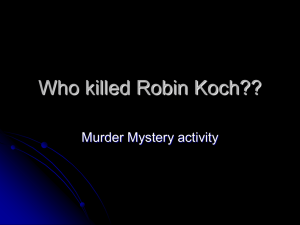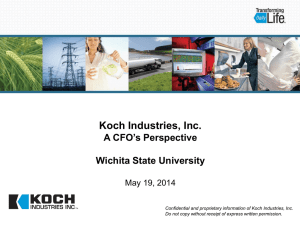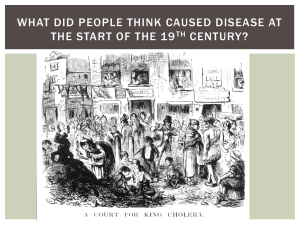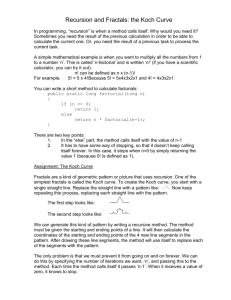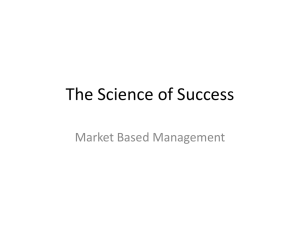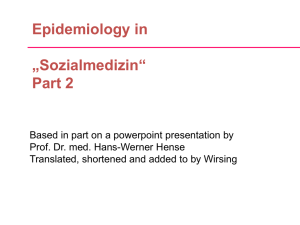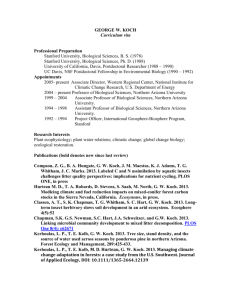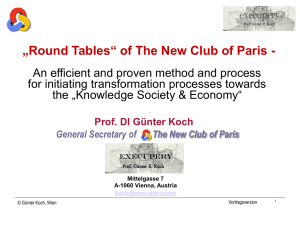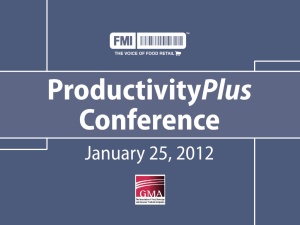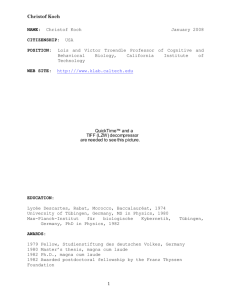File
advertisement
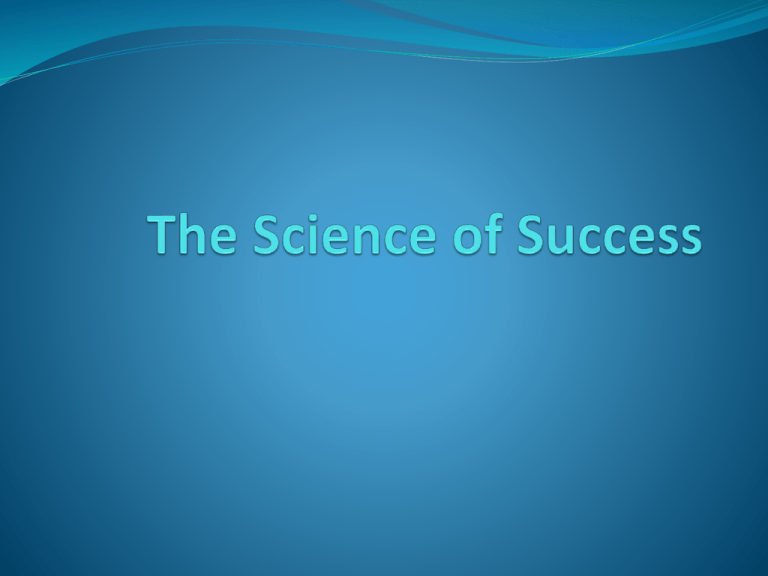
History Koch Industries Inc. 1925 - Winkler-Koch Engineering is formed in Wichita, Kansas 1940s - Koch begins acquiring different companies, most dealing with the refining of oil and wood. 1961 - Charles G. Koch became chairman and CEO of Rock Island Oil & Refining Company, Wood River & Refining Company 1967 Fred C. Koch dies. Koch Industries Inc. 1968 - Rock Island Oil & Refining Company is renamed Koch Industries, Inc 1980’s – Koch begins to diversify, acquiring companies that deal with natural gas, nitrogen and coal. 1993 – The first Market-Based Management (MBM) handbook is published. Koch Industries Inc. 2006 - Forbes magazine names Koch Industries, Inc. as the largest private company in the U.S. 2007 – The Science of Success: How Market-Based Management Built the World’s Largest Private Company was published. Today – Over $100 Billion in Revenue and over 60,000 employees world-wide. Charles G. Koch Charles Koch born on November 1, 1935 in Wichita, Kansas Owns 42% of Koch Industries Brothers Frederick R. Koch David H. Koch William I. Koch Charles G. Koch Net Worth: $31 Billion Of which $25 billion comes from Koch Industries Tied 6th with his brother David Koch on the top 100 billionaires in the world Chairman of the board and chief executive officer of Koch Industries, Inc. Education Bachelor of Arts / Science Massachusetts Institute of Technology Master of Science Massachusetts Institute of Technology Norming Norming Increased cohesion More collaboration Emerging trust Appreciation of differences Open communication Positive/Constructive feedback Market Based Management(MBM) A philosophy that enables organizations to succeed long term by applying the principles that allow free societies to prosper. 5 dimensions of MBM: 1. 2. 3. 4. 5. Vision Virtue and Talent Knowledge processes Decisions Rights Incentives “Where there is no vision, the people perish.” Proverbs 29:18 Vision A system of spontaneous order that maximizes choice, creating sustainable prosperity and societal progress Vision in Business Determine where and how the organization can best create value long-term through a process of experimental discovery An effective business vision begins and ends with value creation for the business. The vision must be specific enough to guide action. Vision guidelines for Business Enlightened Self-interest Embracing change Experimental Discovery Anticipation and Innovation Setting Priorities Enlightened Self-Interest Self-interest is either cooperative or aggressive Businesses must encourage cooperation while punishing destructive self-interest People in the team benefit themselves by benefiting other members of the team Embracing Change Over time competition erodes the profitability of every product or innovation. Business must strive to slow down this decay Business must continually replace products that have reached the end of there life-cycle. Experimental Discovery The driving force for embracing change How business adapt to the future Experiments must be limited in size and scope, to help minimize risk. Experimental discovery creates a process that encourages new improvements, strategies, and innovations. Anticipation and Innovation Companies and customers gain when a company anticipates new opportunities. When a business’ rate of decline overcomes the owner’s ability to innovate the business should be sold. Setting Priorities A business needs to develop and implement strategies that enable it to maximize its long-term value. There is a natural aristocracy among men. The grounds of this are virtue and talents. – Thomas Jefferson Norming and Virtues “Rules of just conduct.” How we act and how we except others to act. Norms of Behavior + Shared Virtues = A Groups Culture MBM Guiding Principles Integrity - conduct all affairs ethically 2. Compliance - %10,000 compliance. Stop, think, ask. 3. Value Creation – create real, long term value by economic means. Eliminate waste. 4. Principled Entrepreneurship – demonstrate the need to generate the greatest contribution to the company and society. 1. MBM Guiding Principles 5. Customer Focus – Understand and develop relationships to satisfy need. 6. Knowledge – Seek, use, and share the best knowledge. 7. Change – Embrace It. Drive creative destruction. 8. Humility – Practice intellectual honesty and constructively deal with reality. MBM Guiding Principles 9. Respect – Appreciate diversity and encourage teamwork. 10. Fulfillment – Produce results the make you realize your full potential. “The greatest obstacle to discovery is not ignorance but the illusion of knowledge.” —Daniel Boorstin Overview Market economies are successful because they are superior at creating useful knowledge Sharing & implementing knowledge Measuring and Tracking Profitability Trade People Make exchanges because they expect to improve their well being Sources of gain from trade: Goods move from people who value them less to people who value them more Specialization allows greater consumption, production, and variety. High volume production leads to lower production cost Trade Trade within a business: A Company must quickly come up with ways to become aware of changes taking place in the marketplace Measures Profit & Loss- What products produce profit? Marginal Analysis- Profit of adding one extra unit of product Benchmarking- examining practices from other places around the world Opportunity Cost- Cost of giving up the next best thing Profit Centers Helps track products & profits directly tied to them Profitability of individual employees should also be measured Not all units within an organization can be tracked as profit centers. Services within a business that don’t generate own revenues (Research Dept.) Free Speech Societies that value freedom & prosperity facilitates the discovery of knowledge Knowledge can be created by challenging others ideas “Republic of Science” example Truth At Koch Industries, truth is what gets results consistent with the principles they set for themselves Challenge process: continually questioning & brainstorming to find a better solution Uses constructive improvement rather than opposition There is a natural aristocracy among men. The grounds of this are virtue and talents. – Thomas Jefferson Norming and Virtues “Rules of just conduct.” How we act and how we except others to act. Norms of Behavior + Shared Virtues = A Groups Culture MBM Guiding Principles Integrity - conduct all affairs ethically 2. Compliance - %10,000 compliance. Stop, think, ask. 3. Value Creation – create real, long term value by economic means. Eliminate waste. 4. Principled Entrepreneurship – demonstrate the need to generate the greatest contribution to the company and society. 1. MBM Guiding Principles 5. Customer Focus – Understand and develop relationships to satisfy need. 6. Knowledge – Seek, use, and share the best knowledge. 7. Change – Embrace It. Drive creative destruction. 8. Humility – Practice intellectual honesty and constructively deal with reality. MBM Guiding Principles 9. Respect – Appreciate diversity and encourage teamwork. 10. Fulfillment – Produce results the make you realize your full potential. “Markets maximize benefits [when they are] supported by externally enforced property right rules that prohibit taking without giving in return” -Vernon Smith Decision Rights Ensuring the right people are in the right roles with the right authority to make decisions and holding them accountable. Change over time Decision rights can be thought of as property rights in an orginization Division Of Labor Specialization of roles that improves the productivity in an organization. The power of the division of labor is diversity Variations in skills, knowledge, culture Human Cooperation Roles, Responsibilities, and Expectations Used to Define general areas of responsibility and accountability Used to avoid inaction and finger pointing. Focus on maximizing contributions Focused on value creation Principled Entrepreneurship Wide spread value creation Decision rights are earned Interaction in face to face discussion Knowledge Sharing “The only combination of rewards and feedback that seems to improve motivation is rewards that depend not only on doing the task, but upon how well it is done plus informational feedback.” -Charles Murray Human Action Three requirements must be present for individuals to act: Unease or dissatisfaction with the present state of affairs 2. A vision of a better state 3. Belief that they can reach the better state 1. By Ludwig von Mises Perverse Inventive Incentive that has an unintended and undesirable result which is contrary to the interests of the incentive makers or company. Examples: 10 percent across the board reduction in budgets or people. Aligning Incentives Incentives that make the employee benefit and the company also benefit from the incentives. Marginal Contribution Portion of value created that can be assigned to a specific change, factor or individual.
